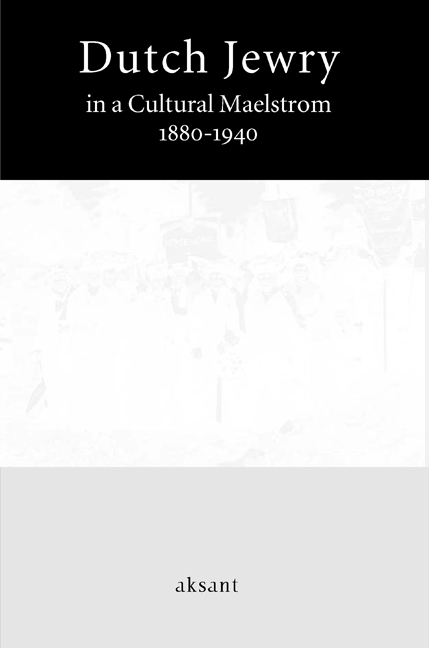Book contents
- Frontmatter
- Contents
- Foreword
- The New “Mosaik”: Jews and European Culture, 1750-1940
- The Politics of Jewish Historiography
- “The First Shall be the Last”: The Rise and Development of Modern Jewish Historiography in the Netherlands Until 1940
- Epigones and Identity: Jewish Scholarship in the Netherlands, 1850-1940
- Judaism on Display: The Origins of Amsterdam's Jewish Historical Museum
- De Vrijdagavond as a Mirror of Dutch Jewry in the Interbellum, 1924-1932
- “Holland is a Country which Provokes Serious Reflection…”: Images of Dutch Jewry in the German Jewish Press
- Spinozism and Dutch Jewry between 1880 and 1940
- Spinoza's Popularity in Perspective: A Dutch-German Comparison
- Mozes Salomon Polak: Jewish “Lerner” and Propagator of Freemasonry, Spiritualism, and Theosophy
- Jewish Women, Philanthropy, and Modernization: The Changing Roles of Jewish Women in Modern Europe, 1850-1939
- Roosje Vos, Sani Prijes, Alida de Jong, and the others: Jewish Women Workers and the Labor Movement as a Vehicle on the Road to Modernity
- Stemming the Current: Dutch Jewish Women and the First Feminist Movement
- Dutch Jewish Women: Integration and Modernity
- Index of Names of Persons
- Index of Subjects
The Politics of Jewish Historiography
Published online by Cambridge University Press: 26 January 2021
- Frontmatter
- Contents
- Foreword
- The New “Mosaik”: Jews and European Culture, 1750-1940
- The Politics of Jewish Historiography
- “The First Shall be the Last”: The Rise and Development of Modern Jewish Historiography in the Netherlands Until 1940
- Epigones and Identity: Jewish Scholarship in the Netherlands, 1850-1940
- Judaism on Display: The Origins of Amsterdam's Jewish Historical Museum
- De Vrijdagavond as a Mirror of Dutch Jewry in the Interbellum, 1924-1932
- “Holland is a Country which Provokes Serious Reflection…”: Images of Dutch Jewry in the German Jewish Press
- Spinozism and Dutch Jewry between 1880 and 1940
- Spinoza's Popularity in Perspective: A Dutch-German Comparison
- Mozes Salomon Polak: Jewish “Lerner” and Propagator of Freemasonry, Spiritualism, and Theosophy
- Jewish Women, Philanthropy, and Modernization: The Changing Roles of Jewish Women in Modern Europe, 1850-1939
- Roosje Vos, Sani Prijes, Alida de Jong, and the others: Jewish Women Workers and the Labor Movement as a Vehicle on the Road to Modernity
- Stemming the Current: Dutch Jewish Women and the First Feminist Movement
- Dutch Jewish Women: Integration and Modernity
- Index of Names of Persons
- Index of Subjects
Summary
Speaking to an audience of German Jewish émigrés in the London Leo Baeck Institute in 1959, Gershom Scholem launched a fierce attack against the fathers of Jewish Studies, the discipline whose most famed representative he himself had by then become. His systematic criticism of nineteenth-century Wissenschaft des Judentums, delivered in German and entitled “Science of Judaism Then and Now”, was itself a milder version of an article published in Hebrew fifteen years earlier under the title “Mitokh Hirhurim ‘al Ḥokhmat Yisrael”. Asked why he changed his tone, Scholem would later say in an interview with Pierre Bourdieu and Jean Bollack: “Well, I regret deeply that I had to speak in this way in front of the Philistines of the Leo Baeck Institute in London… I behaved more or less like those who were able to write for Das Reich without being Nazis. My first Hebrew article was directed toward an audience which was able to think differently.”
The thrust of Scholem's criticism in both essays remained the same, whoever the audience was. His main complaint was that he regarded Wissenschaft des Judentums as a thoroughly apologetic enterprise. He did not, of course, deny the enormous academic achievements of the discipline, but at the same time he regarded the fulfillment of modern Jewish Studies possible only in a Jewish society: “Apologetics was the great stimulus in a battle waged against old and new anti-Semitism… The Science of Judaism was a force in this battle – often a decisive weapon – as we can recognize by looking back on it today.” Scholem goes on to mention that “what went on in the cellar was scrupulously avoided. These scholars considered only the intellectual relations of the salon: the Bible and Luther, Hermann Cohen and Kant, Steinthal and Wilhelm von Humboldt”. Jewish criminals, the underworld, had been left out as a topic of research, for apologetic reasons, just as Jewish mysticism had, Scholem's own area. This all can change in a Jewish state, as he remarked:
The Zionist movement… again understood Judaism as a living organism and not merely as an idea… The new valuations of Zionism brought a breath of fresh air into a house that seemed to have been all too carefully set in order by the nineteenth century.
- Type
- Chapter
- Information
- Dutch Jewry in a Cultural Maelstrom, 1880-19401880-1940, pp. 31 - 42Publisher: Amsterdam University PressPrint publication year: 2008

